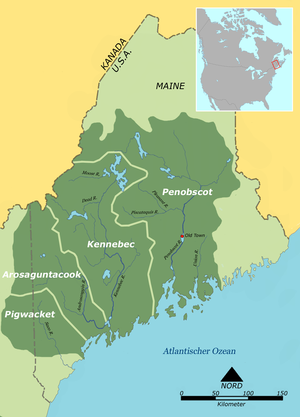Arosaguntacook
The Androscoggin tribe were an Algonquian -speaking Native American tribe in the northeastern North America and among the Abenaki - Confederation of. They lost their identity as early as the 18th century because the last survivors moved to neighboring tribes and mingled with them.
Surname
The tribal name "Arosaguntacook" or "Arossagunticook" which is common today is possibly derived from Alsíkαntəkʷ ("River of the rock dwellings ", "River of the rock refuge"), the Penobscot name for the Androscoggin River . Like the "Arosaguntacook / Arossagunticook", the Penobscot spoke a dialect of the Eastern Abenaki. The form androscoggin is likely an altered form of the name of a former Massachusetts governor Edmund Andros . Other well-known variants were: Arsikantegou, Arsikanteg, Androscoggin, Alessikantek-eyak .
The Pαnawάhpskewəyak (Penobscot) call the Saint Francis Abenaki of the Nation Waban-Aki also Alessikantek-eyak or Aləssikάntəkʷəyak because the Arossaguntacook were among the ancestors of the population of Saint Francis .
Settlement area
The Arosaguntacook once lived on the Androscoggin River and its tributaries; the residential area extended over the south of what is now the US state of Maine and reached into northeast New Hampshire . Their main village was near today's Lewiston . The Arosaguntacook belonged together with the Pigwacket to the southernmost tribes of the Abenaki and were therefore the first to have contact with English colonists in New England .
history
They suffered severely from numerous colonial and Indian wars in which they participated from 1675 until they had to flee to Canada . Their village was burned down by the English in 1690. As the English settlements sprawled up the river, the Wawenoc who lived at the mouth were driven north and taken in by the Arosaguntacook. Later, the two united tribes had to move further upstream and were taken in by the Rocameca who lived there. These migrations led to confusion in the records of various authors, so that the united three tribes were generally referred to only by the name Arosaguntacook. These tribes moved with the Pigwacket to Saint Francis in Canada in 1725 after being crushed by John Lovewell that same year . In Saint Francis they were soon the leading tribe, their Abenaki dialect was adopted by the other inhabitants and finally the entire population was called Arosaguntacook.
An English commando force, the Rogers' Rangers , under Major Robert Rogers attacked Saint Francis, inhabited by 700 Indians , in the autumn of 1759 during the French and Indian War, killing 200 inhabitants while the rest were able to flee. Saint Francis was burned down, but later the Arosaguntacook came back and rebuilt the village.
Also in the American War of Independence (1775–1784) and the British-American War of 1812, part of the Arosaguntacook from Saint Francis participated, but this time on the British side.
Resident in Saint Francis
| year | Residents |
|---|---|
| 1783 | 342 |
| 1810 | 418 |
| 1828 | 380 |
| 1848 | 306 |
| 1874 | 266 |
| 1888 | 330 |
| 1904 | 370 |
swell
literature
- Bruce G. Trigger (Ed.): Handbook of North American Indians . Volume 15: Northeast . Smithsonian Institution Press, Washington DC 1978, ISBN 0-16-004575-4 .
